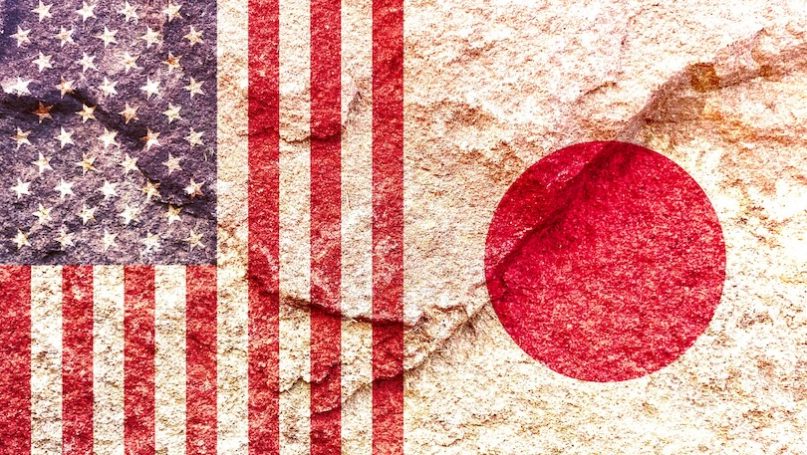
The U.S.-Japanese alliance is one of today’s strongest treaty alliances, shielding threats from China, North Korea, and Russia. Nevertheless, this ironclad alliance is often put to question due to misconceptions about reciprocal defense between Tokyo and Washington. Combining two of the strongest economies, militaries, and soft powers in the world, the Japanese-American alliance has room to grow, even within political turbulence. Against the backdrop of Trump hinting that every U.S. ally should grow its defense apparatus, the POTUS expressed criticism in relation to Japan. On two occasions, President Trump stated that the American-Japanese alliance is “so one-sided.” Furthermore, the President said, “We pay hundreds of billions of dollars to defend them, but they don’t pay anything.” President Trump also told reporters that if America were attacked, Japan would not come to America’s aid. Overall, the President’s arguments ignore historical contexts that could cause a rift in one of the world’s steadfast alliances.
In the aftermath of Imperial Japan’s unconditional surrender, the United States government outlined Tokyo’s constitution, which led to decades of pacifism. In the new American-drafted constitution, Article 9 states that the country cannot have a full-standing military, which is the reason why Tokyo calls their army the Japanese Self-Defense Forces (JSDF). Despite its defensive operational nature, the JSDF consistently ranks in the top 20 armies by firepower amongst all nations. Additionally, Japan’s navy plays a crucial role in the First Island Chain strategy to contain Chinese naval movements in East Asia.
In the aftermath of World War II, the United States hosted permanent military bases in Japan to grow relations with Tokyo, enhance its defense, promote democratic reforms, and maintain a foothold in the Indo-Pacific region. Though Washington pays billions to logistically preserve and strengthen its forces in the Pacific Fleet, the Tokyo government pays for hosting American military bases. Before a 2022 agreement renewal, the Japanese parliament allotted 201.7 billion yen for American military bases. With the renewed agreement, there has been an increase of 250 to 299 billion yen, which equates to 2.6 billion USD. Tokyo also contributes to joint JSDF-U.S. forces training exercises, which take place throughout the Japanese archipelago.
Currently, the United States Forces in Japan (USJF) hosts between 50,000 and 60,000 American military personnel in the country, plus 7,000 contractors—the highest of any U.S. overseas foreign mission. The aforementioned American-made Japanese constitution calls for Japan to provide full base access, which Tokyo upholds. Nagashima Akihisa, a special advisor to Japanese Prime Minister Ishiba, was recently interviewed about Tokyo’s monetary support for American bases. He further emphasized that if Japan paid even more for American bases, it would be akin to paying ‘mercenaries.’ Akihisa also stated that in addition to the salaries of American forces in Japan, the Japanese government pays for the utilities of the bases and Japanese citizens employed in the U.S. facilities.
Japan’s Self-Defense Forces, though under the protection of the United States military, haven’t remained idle to global events. Initially experiencing bureaucratic gridlock due to decades of pacification, Japan’s financial contributions came late during the Gulf War. Nevertheless, Tokyo has expanded the JSDF’s global reach. During the U.S.-led war in Afghanistan, Japan hosted the first international conference to help reconstruct Afghanistan in Tokyo. The Japanese government was one of the top aid contributors to support the impoverished nation until the second Taliban takeover in 2021. During the U.S.-led war in Iraq, Japan sent 5,500 troops as part of the Japanese-Iraq Reconstruction and Support Group. Although Japan did not participate in serious combat operations like Poland, the UK, and the U.S., they played their part by helping to reconstruct Iraqi and Kurdish infrastructure and local governance. In order to enhance foreign operations, the JSDF established its only overseas military base in Djibouti in 2011. There, the JSDF helps providing security and overwatch for Tokyo’s commercial and energy sectors, as the Bab el-Mandeb Strait and the Red Sea are a major economic lifeline to Japanese and the overall global maritime trade.
Tokyo and its self-defense forces are paramount to American interests in the Indo-Pacific and provide a shield against looming existential threats to the continental United States. Amidst increasing tensions in the South China Sea, the United States can rely on Japan’s continued growing military relations with the Philippines to counter Chinese influence on the various islands. With the Luzon Strait, a lifeline to the Japanese economy, threatened by Chinese naval expansion, the JSDF is advancing naval capabilities in Southeast Asia—especially now as American forces are overstretched.
On the Korean Peninsula, aggression from North Korea’s Kim regime continues to put America and South Korea in a precarious position. Japan too sees North Korea as an existential threat as their nuclear weapons are not only pointed at Japan, but missiles continue to land around Tokyo’s maritime space. Through American mediation, Japan is slowly mending relations with South Korea, where both countries now share early warning communications on North Korean missile launches. Regarding the Taiwan Strait and a potential Chinese amphibious invasion or blockade, Tokyo sees the defense of democratic Taipei and the island as existential to Japanese security. The JSDF will almost certainly militarily defend Taiwan alongside the U.S., with China’s rising military capabilities being a primary factor for Japanese remilitarization.
The American-Japanese alliance should remain concrete and continue to expand and enhance cooperation throughout the Indo-Pacific. Japan is vital to the First Island Chain, supports various American military operations, and backfills security voids in Asia and other regions. Despite misconceptions about a one-sided alliance, Tokyo remains a steadfast and tremendous ally.
Further Reading on E-International Relations
- Opinion – What a Stronger Japanese Military Posture Means for Okinawa
- Opinion – Japan’s Military Awakening
- Opinion – The US-Japan Alliance Continues to Stand for Democracy, Despite a Role Reversal
- Opinion – Toward a Japan-South Korea Alliance Less Reliant on the US
- Opinion – Alliance Shock Revisited: What 1968-69 Means for 2025
- Opinion – Okinawa’s Struggle with Ongoing US Military Presence